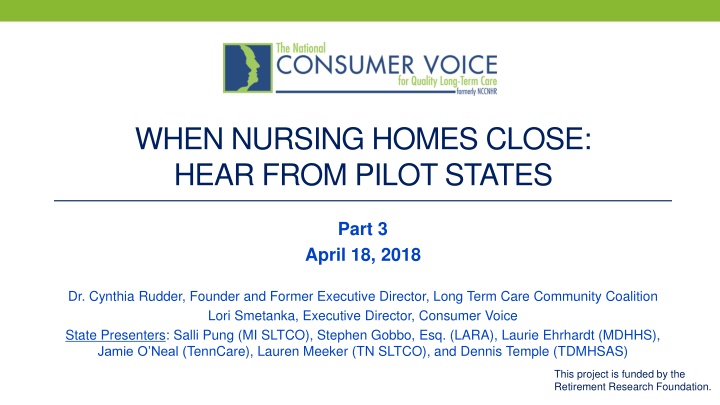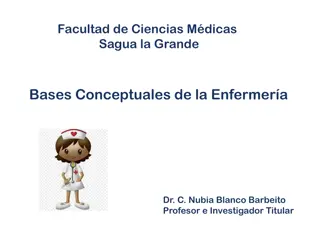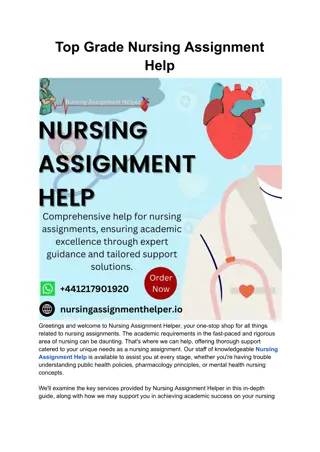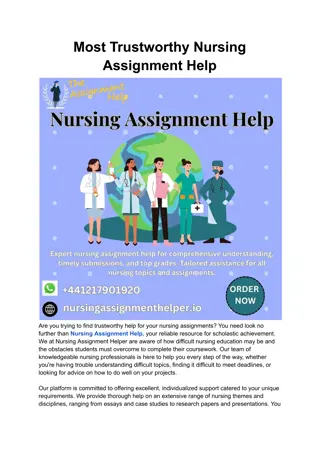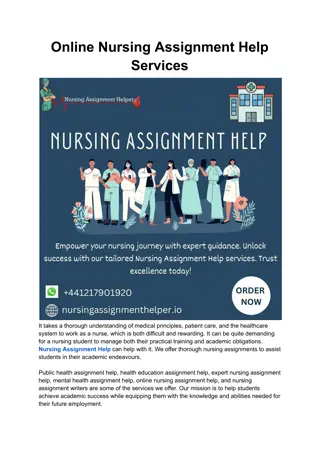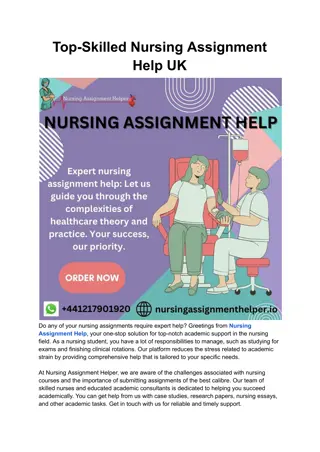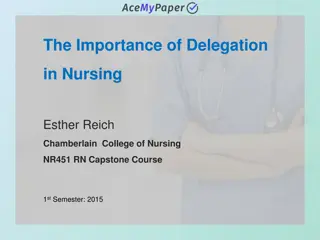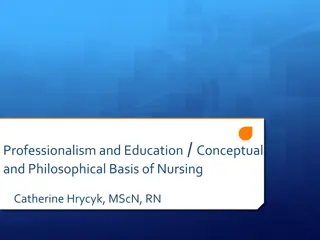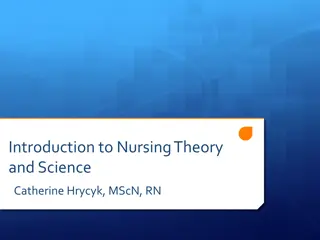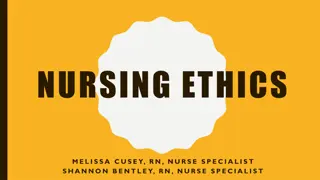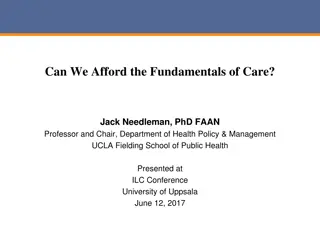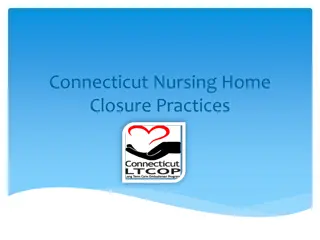Challenges and Impacts of Nursing Home Closure: Insights from Pilot States
This content sheds light on the negative impacts of nursing home closures, including transfer trauma, self-care deficits, depression, falls, and weight loss. It also discusses a 2015-2016 national study funded by the Retirement Research Foundation that aimed to identify obstacles, policies, best practices, and recommendations related to nursing home closures. The conclusions highlight obstacles to successful closure such as lack of appropriate placements, poor discharge planning, communication issues, staffing problems, and transfer trauma.
Download Presentation

Please find below an Image/Link to download the presentation.
The content on the website is provided AS IS for your information and personal use only. It may not be sold, licensed, or shared on other websites without obtaining consent from the author.If you encounter any issues during the download, it is possible that the publisher has removed the file from their server.
You are allowed to download the files provided on this website for personal or commercial use, subject to the condition that they are used lawfully. All files are the property of their respective owners.
The content on the website is provided AS IS for your information and personal use only. It may not be sold, licensed, or shared on other websites without obtaining consent from the author.
E N D
Presentation Transcript
WHEN NURSING HOMES CLOSE: HEAR FROM PILOT STATES Part 3 April 18, 2018 Dr. Cynthia Rudder, Founder and Former Executive Director, Long Term Care Community Coalition Lori Smetanka, Executive Director, Consumer Voice State Presenters: Salli Pung (MI SLTCO), Stephen Gobbo, Esq. (LARA), Laurie Ehrhardt (MDHHS), Jamie O Neal (TennCare), Lauren Meeker (TN SLTCO), and Dennis Temple (TDMHSAS) This project is funded by the Retirement Research Foundation.
Agenda Introduction & Project Overview Lori Smetanka, Executive Director, Consumer Voice Dr. Cynthia Rudder, Project Researcher and Trainer State #1: Michigan Salli Pung, Michigan State Long-Term Care Ombudsman Stephen Gobbo, Esq., Deputy Director, Bureau of Community & Health Systems, Michigan Department of Licensing and Regulatory Affairs Laurie Ehrhardt, Nursing Home Quality Analyst, Medical Services Administration, Michigan Department of Health and Human Services State #2: Tennessee Jamie O Neal, Director of MLTSS and Dual Eligible Initiatives and Operations, Division of TennCare, Long Term Services and Supports Lauren Meeker, Tennessee State Long-Term Care Ombudsman, Tennessee Commission on Aging and Disability Dennis Temple, Director of PASSR, Older Adult Services, and Disaster Mental Health Services; Tennessee Department of Mental Health and Substance Abuse Services Q&A / Closing All panelists
NEGATIVE IMPACTS OF NURSING HOME CLOSURE Transfer trauma (also referred to as "relocation stress syndrome") Self-care deficits - Impaired ability to perform or complete activities of daily living for oneself, such as feeding, dressing, bathing, toileting.
Depression, sometimes manifesting as agitation Increase in withdrawn behavior
Falls Weight loss
2015-2016 NATIONAL STUDY: FUNDED BY THE RETIREMENT RESEARCH FOUNDATION Using online surveys and one-on-one interviews: OBJECTIVES: Identify obstacles Identify policies and procedures for overcoming the obstacles Identify best practices Make recommendations Click here to view the full report.
CONCLUSIONS: OBSTACLES TO A SUCCESSFUL CLOSING Lack Of Appropriate And Nearby Placements Poor Discharge Planning Lack Of Communication Poor Notice/Not Enough Time Staffing Issues Transfer Trauma
STATE BEST PRACTICE CASE STUDIES OHIO WISCONSIN CONNECTICUT Other states with best practices: Iowa South Carolina Washington, DC Rhode Island
2017-2018 Project* During the last 10 months, we have worked with two states as they examined and worked to enhance their nursing home closure process to improve the closure experience for residents: Michigan and Tennessee. Michigan s State Ombudsman Office is independent of the other state agencies. Tennessee is part of the state structure of agencies. * This project was also funded by the Retirement Research Foundation.
Project Activities We gave each state a one and a half day training summarizing our earlier project with the recommendations for ombudsmen and other state agencies.
We asked each state to choose two recommendations to work on and facilitated a discussion as each state developed these goals and created a 12 month workplan.
We spent time on a strategy for meeting each goal. Project staff held monthly or bimonthly conference calls with the full relocation teams of each state, which included state agencies new to the team.
Goals of the Pilot States The full report lists many different recommendations for CMS, States and for Ombudsmen. Please see report for a full list of recommendations. The two states we worked with chose to: Improve/enhance their closure team Include the State Ombudsman in the closure plan review Develop a tool to follow up with transferred residents to prevent deterioration and transfer trauma
STATE #1: MICHIGAN Salli Pung (SLTCO) Stephen Gobbo, Esq. (LARA) Laurie Ehrhardt (MDHHS)
Michigan Presenters Salli Pung, Michigan State Long-Term Care Ombudsman, Michigan Elder Justice Initiative Stephen Gobbo, Esq., Deputy Director, Bureau of Community & Health Systems, Michigan Department of Licensing and Regulatory Affairs Laurie Ehrhardt, Nursing Home Quality Analyst, Medical Services Administration, Michigan Department of Health and Human Services
Benefits Identify Needed Participants Understand Agency Resources Develop A Shared Vision Revisit Roles and Responsibilities Produce Work Products
Obstacles Expectations Beyond Regulations Assumed Take Over Limited History or Experience Confusion for Providers
Application Utilization of New LARA Checklist Evolution of the Closure Experience
STATE #2: TENNESSEE Jamie O Neal (TennCare) Lauren Meeker (SLTCO) Dennis Temple (TDMHSAS)
Tennessee Presenters Jamie O Neal, Director of MLTSS (Managed Long Term Services and Supports) and Dual Eligible Initiatives and Operations, Division of TennCare, Long Term Services and Supports Lauren Meeker, Tennessee State Long-Term Care Ombudsman, Tennessee Commission on Aging and Disability Dennis Temple, Director of PASSR, Older Adult Services, and Disaster Mental Health Services; Tennessee Department of Mental Health and Substance Abuse Services
WHEN NURSING HOMES CLOSE IN TENNESSEE: Working Together to Improve the Transition of Residents April 18, 2018
Tennessee Overview TennCare State Medicaid Agency (SMA) and Medicaid program TennCare managed care demonstration began in 1994 Entire Medicaid population (1.4 million) in managed care since 1994 (including individuals with I/DD) Three health plans (Managed Care Organizations or MCOs) operating statewide Physical/behavioral health integrated in 2007 Managed LTSS began with the CHOICES program in 2010 Includes all Medicaid Nursing Facility Services and HCBS for older adults and adults with physical disabilities Each NF resident has an assigned health plan Care Coordinator 22
TN Nursing Facility Closure Process TN has long had an established process for NF closures o Implementation of CHOICES MLTSS program in 2010 added significant capacity to facilitate this process o Includes partnership with State Survey Agency (Health Care Facilities), CMS, TennCare-contracted health plans (MCOs), Area Agencies on Aging and Disability (intake agency for HCBS) and the LTC Ombudsman Office o Early notification to MCOs to engage Care Coordinators in transition process ( boots on the ground ) o Assessment of capacity in area facilities by SMA or SSA o Detailed written notice to facility residents and family members, including rights and the opportunity to explore HCBS as well as transition to other facilities o Onsite meeting jointly hosted by SMA and SSA to provide information and answer questions All partners in attendance to provide assistance as needed 23
TN Nursing Facility Closure Process o Daily status update call with facility, SMA, SSA, CMS and HCF to review status of all resident transitions (including planned, completed, pending, etc.) hospital admissions, address questions/concerns, etc. o Daily roster (7 days/week) submitted by facility with any updates and changes throughout closure process o Review and discussion with the closing facility regarding Residents funds and personal belongings to confirm these items are inventoried and transferred with each Resident o Ongoing daily communication with MCOs, including updated MCO rosters and transition status for their members a minimum of 3 times per week Allows for reconciliation with facility roster Ongoing engagement/facilitation of transitions by Care Coordinators/team Opportunities to explore HCBS as well as transition to another facility Arrangement of transportation to accommodate transition o Internal processes for escalating applications or document submissions to assist in expediting eligibility determinations, transition to HCBS, etc. 24
Opportunities for Improvement Expanding the team TN Department of Mental Health and Substance Abuse Services is now a part of the NF closure team Documenting the process TN will have a manual that details the process we use for NF closures This manual will be available as a reference and for new staff for the future Opportunities to strengthen and enhance engagement of the LTC Ombudsman in the closure and transition process 25
Tennessee Long Term Care Ombudsman What Positives have come from working together on this project? Improved Relationships Improving Communications Nursing Home Closure Manual for Closure Team
Tennessee Long Term Care Ombudsman Follow Along Baseline Assessment Follow Along Assessment Areas for growth and improvement
Nursing Facility Relocation Process Office of PASRR Collaborating with the Nursing Facility Closure Team and nursing facility staff, the State PASRR office is better able to quickly identify at risk residents due to their clinical status, to determine if: 1. a Change of Status has been submitted 2. if not, if a Change of Status is needed, in light of clinical risk factors 3. and/or a Change of Status is now needed because additional specialized services are required to effect a healthy transfer Dennis Temple, Director of PASRR Older Adult Programs & Disaster Mental Health Services
Nursing Facility Closure Process Office of PASRR The Office of PASRR is on daily calls with the closure team and has incorporated questions into the Ombudsman s Resident Baseline Assessment tool to ensure transferred residents receive any specialized services needed The PASSR Office will also help facilitate access to mental health services for those individuals leaving the nursing facility system If an individual indicates they want to leave the nursing facility system, the PASRR office works with the closure team to ensure they are aware of all mental health care alternatives available to them upon their departure Dennis Temple, Director of PASRR Older Adult Programs & Disaster Mental Health Services
Contact Information Cynthia Rudder crnhcc@aol.com Lori Smetanka lsmetanka@theconsumervoice.org Michigan Presenters Salli Pung spung@meji.org Tennessee Presenters Jamie O Neal jamie.o neal@tn.gov Stephen Gobbo, Esq. gobbos@michigan.gov Lauren Meeker lauren.meeker@tn.gov Laurie Ehrhardt ehrhardtl@michigan.gov Dennis Temple dennis.temple@tn.gov
